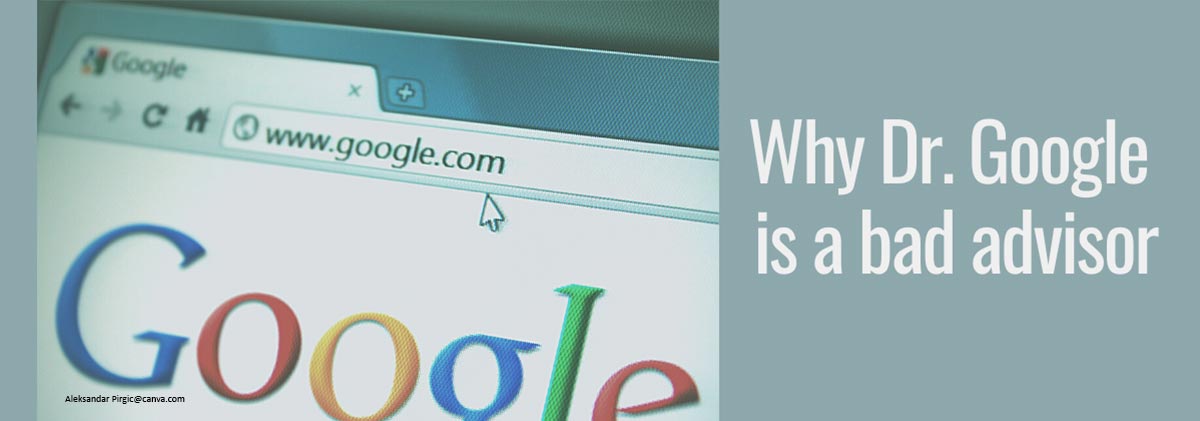
Hypochondria: How to overcome fears of illness
In hypochondriacal disorder, sufferers are often convinced that they are suffering from a serious illness that just hasn't been discovered yet, such as a brain tumor. The more pronounced the fear of illness, the more often it happens that hypochondriacs constantly visit new doctors. The driving force behind this is the hope that someone will finally discover the disease that all medical professionals have previously overlooked. But no matter how many doctor's visits are made, the diagnosis is one after the other: hypochondria (formerly Hypochondriasis). Unfortunately, this does not reassure a real hypochondriac. It could be that something was really overlooked.
Important :
Hypochondria is a serious anxiety disorder! Sufferers are not simply snivelling or anxious, but actually experience both physical and psychological symptoms of illness. Just because these are psychosomatically triggered does not mean that hypochondriacs are faking. But fortunately, there is now a good self-therapy that can quickly and permanently overcome hypochondria.
Hypochondria: What is really behind the fear of illness?
Of course, doctors can also overlook something or be wrong with their diagnosis. However, if not one, but dozens of doctors come to the same conclusion, then the probability is quite high that the complaints are really only imagined and a hypochondriacal disorder is present.
However, this does not mean that those affected do not really suffer from physical symptoms and the fears they trigger. These symptoms are just not triggered by a physical illness, but by the psyche, i.e. the obsessive focus on "possible" illnesses.

For hypochondriacal disorders triggered by permanent googling for diseases, there are now even own technical terms, namely "cyberchondria" or also "Google disease". The fact is that anyone who asks the search engine what this or that physical symptom could still mean and what rare disease they might be suffering from in the worst case runs the risk of making their hypochondriacal disorder even worse. Because by its very nature, Google not only provides a possible cause for the stinging in the chest or the inexplicable fatigue, but also lists dozens of different clinical pictures in which the searched symptoms can also occur.
However, this constant focus on possible diseases, especially if it takes place regularly, is not without consequences for the brain. The permanent mental examination of various diseases and their symptoms ensures that the brain becomes more and more neuronally efficient in perceiving even the smallest discomfort in the body so strongly that even the physically healthiest person has the feeling of being seriously ill within a few weeks.
This predisposition promotes the emergence of hypochondria
According to statistics, up to 10% of the U.S. population suffers from hypochondria, with men affected as often as women. But why do so many people become hypochondriacs in the first place? In conventional medicine, it is generally believed that people with hypochondria are better able than others to perceive feelings within the body. The technical term for this is an increased, interoceptive perception. As a result, completely harmless feelings that everyone has several times a day, such as a tingling sensation, a pulling sensation in the muscles, a brief shiver of warmth or cold, and much more, are overinterpreted and sometimes even classified as threatening.
If these misinterpretations accumulate, in the course of time even further anxiety disorders can develop from them, such as recurring panic attacks. That is why it is important to do something about hypochondria at an early stage with psychotherapeutic measures.

How to get rid of hypochondria with a little practice
In the course of psychotherapy, hypochondriacs can learn to soften their worrying thoughts with a few simple techniques so that the doctor’s word carries sufficient weight again and has such a calming effect that you can finally turn your attention back to the pleasant things in life. Which technique is most suitable for this depends on whether you rely more on your eyes, i.e. are a visual type, or belong more to the auditory type, who go more by what they hear.
Rather visual people are controlled less by inner dialogues (“What if the doctor missed something after all?”), but rather by the images that appear before your inner eye. Experience has shown that people with this disposition get along very well with the visual sliding technique, which is why I will go into this in more detail in a moment.
By the way, the visual sliding technique is only one of many strategies developed at the Institute for Modern Psychotherapy. With these strategies, many people have already succeeded in finally living a life without the permanent fear of illness. If you want to learn more about it, we recommend you to watch the first episode of the online video course “The Anxiety Cure”, which are currently available for free.
Hypochondria: Which therapies help best?
Of course, it is also possible to successfully combat a hypochondriacal disorder with cognitive behavioral therapy or solution-oriented brief therapy (according to Steve De Shazer). However, the experience of recent years has shown that the Bernhardt Method often makes it even faster and more pleasant to overcome an anxiety disorder. On the one hand, because the Bernhardt Method completely avoids the use of psychotropic drugs, and on the other hand, because the latest findings in brain research have been used to develop better anxiety-stopping techniques. The Bernhardt Method also differentiates whether you are a visual, auditory or kinesthetic type of person, i.e. someone who pays attention to even the smallest physical discomfort and then possibly overinterprets it.
How the Visual Slide Technique helps to stop fears
In the Visual Slide Technique, you concentrate (preferably with your eyes closed) for a moment on the inner image that frightens you. Perhaps you see yourself already seriously ill in the hospital, or an image forces itself on you, how you come without hair straight from a chemotherapy. Both are indeed extremely unpleasant images, but they are often part of everyday life for visually predisposed hypochondriacs. However, anyone who manages to pay attention during such a thought to whether the negative scene appears more on the left side of the head or perhaps more on the right can immediately test the visual shifting technique.
Assuming that the unpleasant scene would tend to be on your left, try mentally shifting this image to the far right. For most people who do this exercise for the first time, the image gets stuck right in the middle. What follows will probably seem "too" simple to some people for it to have such a big effect. If you allow your negative inner image to change during the shifting process, it will often not only move slightly to the right, it will literally disappear into thin air. And a fearful inner image, which you can simply no longer perceive thanks to the visual shifting technique, no longer triggers a fear of illness at this moment. Just give it a try. Especially visual types are often amazed at how simple and helpful this simple technique is.
If you train the Visual Slide Technique a little, then you are no longer helplessly at the mercy of your obsessive thoughts about a possible illness, but you can make them disappear within seconds - and thus the hypochondriacal disorder weakens more and more.
By the way: You can now find many more anxiety-stopping techniques, with which you can stop not only hypochondria, but also many other anxiety disorders quickly and easily, in our online video course: THE ANXIETY CURE. In Europe, this video course has been successfully used for self-therapy for over 5 years and has already helped thousands of people there to lead an anxiety-free life again. For half a year now, this course is also available in English, and you can test it completely risk-free, because we offer a 60-day money-back guarantee, should the course not show the desired result with you.
Antidepressants: Why they do not help with hypochondria
Because of the severity of most anxiety disorders, many doctors and therapists quickly reach for medications. The prescribed drugs will provide quick relief from suffering and help patients regain their emotional balance. So it's no wonder that antidepressants are among the most commonly prescribed medications worldwide.
For a long time, it was assumed that people suffering from depression or anxiety had low serotonin levels in their brains. This neurotransmitter was thought to be responsible for feelings such as contentment and happiness. That this is not true, however, has now been clearly proven by studies. Nevertheless, many psychiatrists continue to believe and tell the fairy tale of the alleged lack of serotonin if you want to explain the emergence of anxiety disorders or depression. And that is why these drugs are still prescribed, although they often increase anxiety. Therefore, the study linked here should be required reading for all sufferers who have been taking antidepressants (SSRIs) for a long time.
Good to know:
If a psychiatrist or psychotherapist tells you that you cannot get well without antidepressants, be skeptical! Because this statement not only contradicts all current studies, but also ensures that you only suppress symptoms, while the true triggers of the disease anxiety remain untreated.
Hypochondria arises from improperly trained focus
Exaggerated fears of illness are triggered by a wrongly trained focus on actually harmless, physical symptoms. In addition, unfavorable thinking and behavioral patterns ensure that this disease becomes more and more widespread if it is not treated psychotherapeutically.
Unfortunately, the prescription of psychotropic drugs often gives sufferers the false impression that they do not need to change these patterns of thinking and behavior. They are often unaware that medication does NOT combat the cause of the anxiety disorder, but merely suppresses the perceived symptoms. However, since antidepressants in particular are known to have sometimes serious side effects, hypochondriacs not infrequently risk that the imagined illness (hypochondria) will be joined by other problems such as weight gain, loss of libido or sleep disorders.

This is how the brain can properly unlearn hypochondria
Hypochondria is in principle nothing more than an unconsciously learned focus on physical problems and all kinds of insensations. But something that can be learned can also be unlearned. And this unlearning happens fastest when you retrain your focus. Away from diseases and towards more joy of life, lightness and self-determination.
Probably the fastest way to retrain one's own psyche so that hypochondria often largely disappears after just a few weeks is the 10-sentence method. This is an elementary component of the Bernhardt Method and can also be learned comfortably from home via an online video course. If you feel like it and have the time, you can watch the first episode of this video course right here for free.
Our Tip:
"With the help of the Bernhardt Method, hypochondria can be literally switched off in the brain. The online video course “THE ANXIETY CURE” guides you step by step through this process and often results in a significantly reduced feeling of anxiety after just a few days."
Let's take this opportunity to talk about all the people who don't really suffer from hypochondria, but only flirt with the term: "I'm a real hypochondriac. As soon as someone just talks about having a scratchy throat, my throat immediately starts to feel raw and uncomfortable, too." But since you don't like this feeling, you now watch very closely if and when it goes away. And this is exactly the biggest mistake you can make, because every focus on a supposed problem increases it, as the following example impressively proves:
Have you ever been to a classical concert? Everyone sits quietly and waits tensely until the conductor enters the stage. But suddenly someone has to cough, once, twice - then they quickly rummage for a handkerchief to muffle the further coughing as best they can with the cloth. But while one person is still struggling with the urge to cough, in many another a downright absurd head cinema begins.
"I hope I don't have to cough now either, somehow my throat feels really scratchy right now. Oh, if only I had something to drink with me. Now just don't cough..." But the very thought of not wanting to cough triggers precisely that unpleasant feeling in the throat that can actually only be halfway rid of again by coughing.

Instead of calling yourself a hypochondriac, tell yourself that you are very empathetic and can empathize well with others. Then quickly direct your attention to someone with whom your empathic streak will benefit you. Or even better, if possible, let yourself be infected by humor and good humor rather than by scratching, itching, and other physical symptoms. Because you can also consciously train this focus and the result is also much more fun.